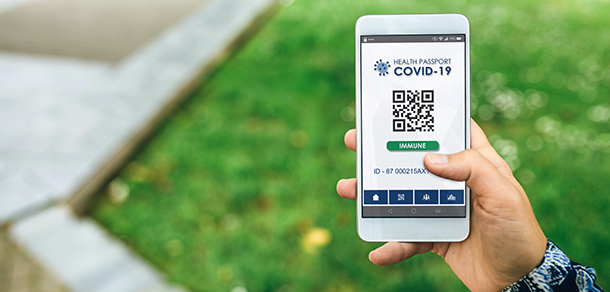Digital ID immunity passports gain steam around the globe
11 August, 2020
category: Digital ID, Government, Health
Digital ID technology, already on the upswing during the pandemic, has gained an even higher profile in recent weeks as governments try to reduce the spread of COVID-19 and reopen their societies using new tech such as digital ID immunity passports.
One recent example comes from WISeKey International Holding Ltd.
In July, the Switzerland-based cybersecurity and Internet of Things company released an app called WIShelter that “includes the ability for users to upload and digitally certify the results of their COVID-19 test facilitating international travel as users can certify that they are not infected with the COVID-19.”
The technology uses blockchain as part of the general digital ID effort to ensure that users stay up-to-date with their health information — which in turn allows “local governments to enable healthy persons to safely return to their jobs, thus (reducing) the economic impact of the epidemic while protecting the high-risk population by controlling the spread of this infectious disease.”
Digital ID immunity passports for sports, travel, and work
So-called digital ID immunity passports — also known as “health passports” — reportedly are being tested in Estonia and other areas. The idea behind the digital ID tool amounts to collecting health testing data — that is, updates on a person’s COVID-19 testing status — so that it can be shown to employers, airlines and other authorities and organizations with control over building and travel access.
For instance, UK-based VST Enterprises has launched a digital health passport product called Covi-Pass to some 15 countries — Canada, India and France among them — for use in facilitating the fuller return of football, golf, car racing and other sporting events.
Here’s how the technology works, according to VST: “The app would be used in conjunction with a Government/Department Of Health approved COVID-19 testing kit administered by a doctor or healthcare professional that confirms and validates whether the holder has been tested ‘negative’ or ‘positive’ for the coronavirus or has the antibody present. In the future it will include confirmation that they are vaccinated. Once the test has been completed, the results will be updated to the fan’s digital passport.”
The VST effort stands as a representative example of how technology and digital ID providers are seeking to develop and use their tools to help control movement and mitigate pandemic health risks — risks that look likely to continue well into 2021 and perhaps longer.
Other digital ID immunity passport programs are simpler. That includes a push in Chile to use smartphone QR codes in service of issuing what the government there has called “release certificates,” issued to people who have gone at least 14 days without symptoms of the coronavirus.




